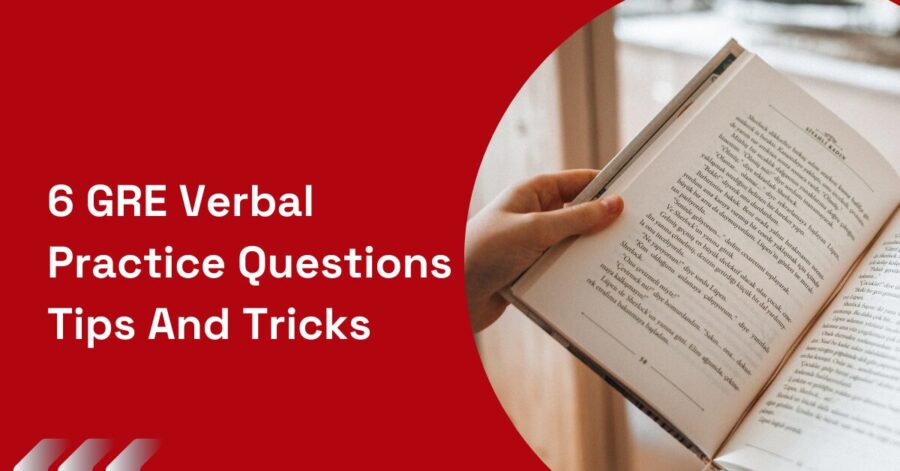4 October 2024
7 minutes read
6 GRE Verbal Practice Questions Tips And Tricks

Key Takeaways
- Mastering the three GRE Verbal question formats—Reading Comprehension, Text Completion, and Sentence Equivalence—is crucial for confident test-taking.
- Rely on context clues to decode tricky questions, rather than just memorizing vocabulary.
- Prioritize quality practice that sharpens critical thinking and strategic approaches over repetitive drills.
The GRE Verbal section has a bit of a reputation—it’s that part of the test where suddenly, even words you thought you knew start looking foreign. We’ve all been there, staring at a passage, wondering how a simple sentence could feel like decoding a cryptic message. And let’s not even talk about those tricky answer choices that seem to blur together the longer you look at them.
It’s not that you don’t know the words, or you haven’t practiced enough. The real battle is understanding the types of questions and the clever traps the GRE likes to set. But here’s the good news: with the right approach and a solid GRE action plan, you can outsmart those confusing questions. Let’s check some tips that can help you make sense of it all, so you can walk into test day feeling more prepared and a little less like you’re navigating a maze of trick questions.
What Is On The GRE Verbal Reasoning Section?
The GRE Verbal section isn’t just a vocabulary test—it’s a comprehensive evaluation of your ability to understand, analyze, and interpret complex written material. This section tests your verbal reasoning skills through a variety of question types that go beyond simply knowing words.

You’ll be dealing with reading passages, tricky sentence completions, and answer choices that can make you second-guess even the most familiar terms. The key to mastering the GRE verbal section is knowing how to approach each question type strategically, rather than relying on sheer memorization.
To succeed in GRE verbal practice, you’ll need to familiarize yourself with its format and the specific types of questions you’ll encounter – Read prominent GRE verbal books available in the market. This part of the GRE test is all about how well you can pick apart a passage or complete the sentence with the right word choices. Below, we break down the main question types you’ll face and what they require from you on test day.
| GRE Verbal Section Overview | Details |
|---|---|
| Number of Sections | 2 sections, each with approximately 20 questions. |
| Time Per Section | 30 minutes per section. |
| Types of Questions | – Reading Comprehension (passage-based) – Text Completion (fill in the blank) – Sentence Equivalence (select two correct answers) |
| Reading Comprehension | Involves reading one paragraph or more and answering questions about it. You’ll often find answer choices that seem correct, so careful analysis of the passage is key. |
| Text Completion | You will complete the sentence with the most appropriate words. Some questions have one blank, while others have two or three blanks. |
| Sentence Equivalence | These questions consist of one sentence with one blank. You are required to select two answer choices that complete the sentence with similar meanings. |
| Answer Choices | Multiple-choice for GRE Reading Comprehension and Text Completion, but Sentence Equivalence requires selecting two correct answers. |
| Skills Tested | – Ability to understand complex passages – Identifying relationships between ideas – Grasping vocabulary in context – Analyzing sentence structure |
| Study Tools | Flashcards, GRE practice tests, and question drills focused on GRE verbal practice are highly recommended. |
6 Expert Tips And Tricks To Handle GRE Verbal Practice Questions
With its tricky question formats, vocabulary-heavy passages, and subtle differences between answer choices, it’s designed to test not just your reading skills but also your ability to think critically within the context of complex material. The good news? With the right GRE strategies, you can understand the verbal reasoning questions on the GRE like a pro.
Below are six expert tips that will help you tackle the GRE verbal practice questions and boost your chances of scoring high on test day.
1. Break Down Each Question Type
The verbal section on the GRE consists of three main types of questions: Reading Comprehension, Text Completion, and Sentence Equivalence. Each is designed to test different aspects of your verbal reasoning ability. Familiarize yourself with the structure and purpose of these question types to know what each question is asking for and avoid common traps. This will help you feel more confident, even if the passage or vocabulary or root word seems unfamiliar.
2. Use Context Clues to Identify Key Words
In Text Completion and Sentence Equivalence questions, identifying crucial words or phrases within the sentence is essential. Often, these questions require you to complete the sentence logically, using the first blank as a guide for the correct answer choice. Understanding how words function within the context will help you rule out partially correct answers and zero in on the right ones.
3. Focus on One Section at a Time
During the GRE exam, you’ll encounter two verbal sections—each about 30 minutes long. It’s important to treat each section independently. Don’t let a tough question from the first section throw off your focus for the second verbal section. By taking one section at a time, you can better manage your time and attention, which is crucial to getting the best score possible.
4. Eliminate Answer Choices Strategically
When faced with tricky answer choices, especially in Reading Comprehension questions, focus on eliminating the obviously wrong answers first. Many questions are designed to test your ability to distinguish between choices that seem correct at first glance but don’t fully match the sentence in the passage. Narrowing down the options can make finding the correct answer choice much easier.
5. Practice Makes Perfect—But Quality Matters
Whether you’re using an online GRE prep course or official GRE practice tests, make sure you’re getting enough exposure to the types of questions you’ll encounter on test day. The questions on the GRE are designed to test more than just your vocabulary—they assess your ability to understand complex ideas. Don’t just focus on quantity; focus on understanding why the correct answer is right and why the other choices are wrong.
6. Take Advantage of Flashcards for Vocabulary Building
A strong vocabulary is crucial for mastering the GRE sections. Flashcards are one of the best tools to build up your vocabulary, especially for Sentence Equivalence questions that test your knowledge of similar words. Make sure to review vocabulary words daily leading up to your test date. The more familiar you are with the words, the easier it will be to quickly identify correct answers on test day.
5 GRE Verbal Practice Questions 2024
The GRE Verbal Reasoning section is designed to test your ability to analyze written material, evaluate arguments, and understand complex ideas within a given context.

To help you sharpen your skills, here are five practice questions that reflect the types of challenges you’ll face on the GRE in 2024. Each question is followed by a brief explanation to help you understand the reasoning behind the correct answer.
1. Text Completion (One Blank)
“Although the scientist’s early theories were initially considered _______, they were later validated through extensive research.”
A) controversial
B) obsolete
C) groundbreaking
D) simplistic
E) erroneous
Explanation:
The correct answer is A) controversial. The word “although” signals that the sentence is contrasting the initial reaction to the scientist’s theories with later validation. “Controversial” fits best in the context of an idea that was initially debated but later proven correct.
2. Sentence Equivalence
“The book was both comprehensive and _______, covering every aspect of the subject without leaving any detail unexplored.”
A) vague
B) insightful
C) superficial
D) thorough
E) comprehensive
F) redundant
Explanation:
The correct answers are B) insightful and D) thorough. The sentence requires two words that reinforce the idea of being comprehensive, so “insightful” and “thorough” best complete the sentence with a similar meaning.
3. Reading Comprehension
Passage Excerpt:
“Some scientists argue that the increase in global temperatures is due to natural climate cycles, while others point to human activities as the primary cause of this change.”
Question:
According to the passage, what is the main point of disagreement between the scientists?
A) Whether global temperatures are increasing
B) The causes of the increase in global temperatures
C) The impact of natural climate cycles
D) The methods used to measure global temperatures
Explanation:
The correct answer is B) The causes of the increase in global temperatures. The passage makes it clear that the disagreement is about whether natural cycles or human activities are the main cause of temperature increases.
4. Text Completion (Two Blanks)
“The artist’s latest exhibition was praised for its _______ creativity, though some critics found the underlying themes to be somewhat _______.”
A) boundless
B) predictable
C) innovative
D) controversial
E) simplistic
F) profound
Explanation:
The correct answers are A) boundless and E) simplistic. The first part of the sentence refers to the artist’s creativity in a positive light, so “boundless” fits. The second part contrasts this praise with some criticism, where “simplistic” works best to convey the critics’ view.
5. Sentence Equivalence
“Despite his tendency to be _______, the politician managed to persuade even his staunchest critics during the debate.”
A) eloquent
B) indecisive
C) charismatic
D) wavering
E) confident
F) fickle
Explanation:
The correct answers are B) indecisive and D) wavering. Both words describe someone who is not firm in their decisions, which aligns with the contrast implied by “despite,” before noting the politician’s success in persuasion.
Conclusion
At the end of the day, the GRE isn’t just testing what you know, but how well you can apply that knowledge under pressure. Stay patient with yourself, keep refining your skills, and trust the process. You’ll be walking into that test room feeling ready to tackle whatever the GRE throws your way.
Master the GRE and take a significant step toward graduate school admission with Ambitio as your strategic partner. Our platform provides a comprehensive suite of resources, from expertly designed lessons to personalized feedback, all aimed at helping you secure a score that reflects your true academic ability.
FAQs
What is the GRE?
The GRE (Graduate Record Examination) is a standardized test required for admission to many graduate schools. It assesses skills in verbal reasoning, quantitative reasoning, and analytical writing.
How much does it cost to take the GRE?
The registration fee for the GRE is $205 in the United States and $190 in other locations. This fee includes sending scores to up to four graduate programs
How do I register for the GRE?
You can register for the GRE online at the ETS website, by phone, or by mail using a GRE Authorization Voucher Form
When can I take the GRE?
The GRE is offered year-round at various test centers worldwide. Paper-based tests are available three times a year where computer-based testing is not available
How many times can I take the GRE?
You can take the GRE an unlimited number of times, but you must wait at least 21 days between tests. However, you can only take it a maximum of five times within a calendar year
How long are GRE scores valid?
GRE scores are valid for five years from the date of the test

You can study at top universities worldwide!
Get expert tips and tricks to get into top universities with a free expert session.
Book Your Free 30-Minute Session Now! Book a call now




























